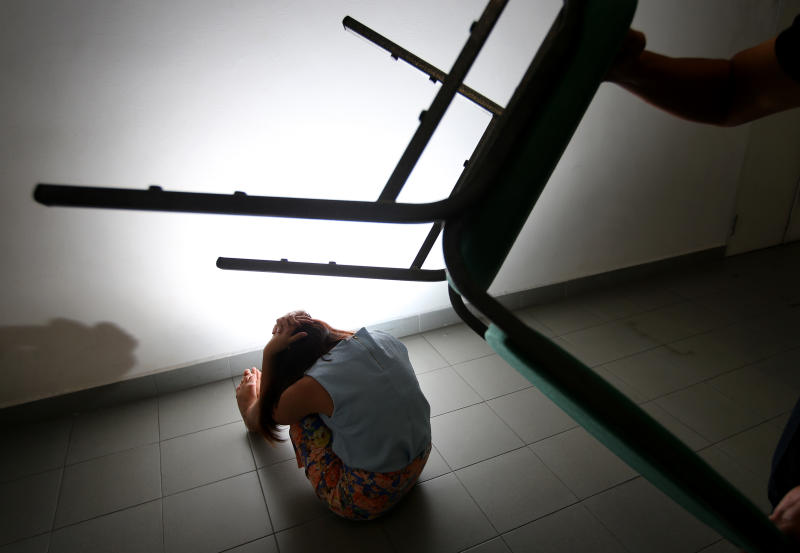Parliament: Harsher penalties, swifter action for crimes against children, maids and the disabled; voyeurs to face heavier punishments
Sign up now: Get ST's newsletters delivered to your inbox

Posed photo of someone being abused. Under a proposed law, those who commit any type of crime against vulnerable people can be taken in by the police even without an arrest warrant.
PHOTO: ST FILE
Follow topic:
SINGAPORE - People who commit any type of crime against vulnerable people, such as young children, maids and the disabled, can be taken in by the police even without an arrest warrant, under a proposed law debated in Parliament on Monday (May 6).
If found guilty, their punishment could be twice the maximum penalty, compared with the current 1½ times for some offences.
Currently, non-arrestable offences require the police to obtain an arrest warrant to detain a suspect.
The change in the Penal Code "will allow the police to intervene quickly", said Minister for Law and Home Affairs K. Shanmugam when presenting the Criminal Law Reform Bill for debate.
The move is in regard to crimes committed against children below the age of 14, those with mental or physical disabilities, and domestic workers.
It is among the wide-ranging provisions of the Criminal Law Reform Bill, a major part of which gives stronger protection for those who cannot protect themselves.
Under the Bill, those in intimate or close relationships with their abusers will also be considered vulnerable victims.
Certain offences against them will entail twice the maximum punishment and such crimes include rape, wrongful confinement and causing hurt.
Those in intimate relationships include victims who live in the same household, share daily tasks and duties, and rely financially on their abusers.
Those in close relationships could include people living in the same household and those who have frequent contact with one another.
The proposed changes also introduced new offences to address the serious abuse of children, the disabled and maids.
For example, it will be a crime to cause or allow the death of a victim under these groups, and this will deal with a situation where two or more people had the exclusive opportunity to cause the death of the victim but both deny any ill-treatment of the victim.
"In such cases, it can be very difficult to prove in court who committed the abuse, and who permitted the abuse. Currently, where such ambiguity exists, there is the possibility that both persons may be acquitted, which is not right," said Mr Shanmugam, adding that this will not cover deaths resulting from natural causes or accidents.
OTHER NEW OFFENCES
These are introduced in the Bill to deal with emerging crimes such as taking upskirt pictures, flashing and revenge porn.
Such offences are currently dealt with under general provisions of the Films Act and Penal Code, like insult of modesty, distribution of obscene materials and criminal intimidation.
Under the Bill, the specific act of voyeurism, which involves the non-consensual observation or recording of someone doing a private act, will be criminalised and it will also be a crime to make or distribute voyeuristic recordings.
This will provide proper framing for such offences and adequate punishments, said Mr Shanmugam, adding that there has been an increase in such crimes.
The new offences will also criminalise the act of sexual exposure, which can come in the form of flashing or cyber-flashing, and make it an offence to distribute or threaten to distribute intimate images, also known as revenge porn.
The Bill also includes new offences to deal with the sexual exploitation of young people and existing offences will be updated to deal with technological developments that have made it easier for predatory offenders to groom and exploit the young.
An offence involving sexual exploitation of those aged 16 to below 18 will be introduced, as well as offences that tackle sexual communication.
The threshold for the existing offence of sexual grooming will be also lowered by reducing the required instances of prior contact between the minor and the offender from two to one, and by lowering the minimum age of the offender from 21 to 18.
Mr Shanmugam said the changes target the prevention of predatory conduct and allow the authorities to intervene early.
"(This will) ensure that the child is protected before the offender meets (him or her) to commit additional, more serious sexual offences, which could cause greater physical and psychological harm," said Mr Shanmugam.

